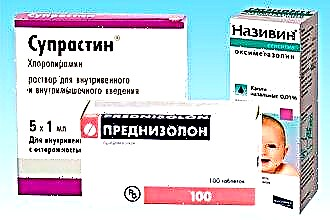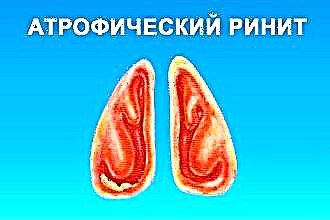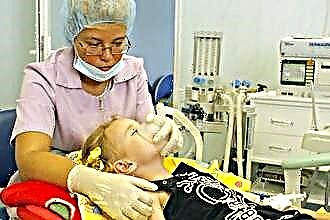Often, inflammation is accompanied by swelling of the larynx. How to relieve swelling of the throat, what are the causes of the symptom, how to diagnose and treat it.
 It is known that throat edema is rarely an independent disease. Most often, it indicates the development of various pathological processes in the human body. Moreover, this condition is extremely dangerous, as it can lead to suffocation with a rapid increase in swelling and narrowing of the lumen in the larynx. In this case, you need to know how to relieve the swelling of the throat in order to quickly restore breathing. In the treatment of throat edema, both medicinal methods and methods of traditional medicine are used. In order to find the most effective treatment, it is necessary to determine the causes of the pathological condition.
It is known that throat edema is rarely an independent disease. Most often, it indicates the development of various pathological processes in the human body. Moreover, this condition is extremely dangerous, as it can lead to suffocation with a rapid increase in swelling and narrowing of the lumen in the larynx. In this case, you need to know how to relieve the swelling of the throat in order to quickly restore breathing. In the treatment of throat edema, both medicinal methods and methods of traditional medicine are used. In order to find the most effective treatment, it is necessary to determine the causes of the pathological condition.
Causes
Various factors, both inflammatory and non-inflammatory, can cause swelling. To understand how to relieve throat swelling, you should analyze the possible causes of the unpleasant symptom. So, soreness and swelling in the throat can be caused by:
- laryngitis;
- tonsillitis;
- inflammation of the oral mucosa;
- purulent inflammation of the base of the tongue;
- allergic reactions to drugs, food;
- abnormalities in the work of the kidneys, liver, organs of the cardiovascular system;
- problems with blood circulation in the pharyngeal region as a result of excessive compression of the lymph nodes;
- mechanical damage during surgery, mucosal burns.
To prescribe the correct and effective treatment for swelling in the throat, you should know not only the causes, but also the main symptoms of the disease.
Symptoms
Among the main signs of edema are:
- soreness when swallowing saliva and food;
- dry, sore throat;
- noisy breathing;
- difficulty breathing, as a result of increased swelling and narrowing of the throat;
- hoarseness leading to complete loss of voice.
As the pathological process worsens, the swelling increases, shortness of breath appears, pallor of the skin, rapid pulse, and a feeling of panic may be observed.
On visual inspection in the area of edema, a thickening of the epiglottis is noticeable, and the swelling can also spread to the arytenoid cartilage.
Puffiness caused by inflammatory processes is characterized by pronounced redness of the mucous membrane, vasodilation. Whereas edema of a non-inflammatory nature is not accompanied by hyperemia.
Treatment
If the patient experiences a feeling of tightness and sore throat, he should be given immediate help to quickly relieve the swelling of the throat and restore breathing.
Important! If first aid for laryngeal edema is not provided on time, there is a risk of complications, development of asphyxia and suffocation.
How to treat throat swelling? Before providing qualified medical care, you can reduce the swelling yourself.
 The first thing to do when the throat is swollen is to facilitate the access of oxygen: unbutton the collar, take the person out into fresh air.
The first thing to do when the throat is swollen is to facilitate the access of oxygen: unbutton the collar, take the person out into fresh air.- If the edema is caused by an allergy, you should stop the exposure of the allergen to the body and take antihistamines (Suprastin, Diazolin). In difficult situations, to relieve laryngeal edema, treatment is based on the use of corticosteroids (Dexamethasone, Prednisolone).
- To reduce swelling, vasoconstrictor drugs (Nazol, Nazivin) can be instilled into the nose.
- With the development of edema as a result of an insect bite, it is necessary to apply a tourniquet or bandage above the lesion site, take an antihistamine.
- Puffiness caused by a viral or bacterial infection is treated with antiviral drugs or antibiotics, depending on the type of infection.
- To alleviate the symptom, hot foot baths are used, mustard plasters are placed on the calves.
Inpatient treatment is primarily aimed at performing procedures that will relieve puffiness and restore breathing. In this case, treatment can be carried out both conservatively and with the use of surgical intervention.
Conservative therapy includes a set of measures aimed at quickly normalizing the patient's condition and restoring full breathing. For this, the following drugs are used:
- antiallergic agents;
- antibiotics (Augmentin);
- corticosteroids;
- diuretics (Furosemide);
- intravenous administration of vitamin C, calcium gluconate and glucose to support the body;
- sedatives and tranquilizers (Apaurin, Diapam).
Also, inhalations with adrenaline and hydrocortisone are used as a treatment, oxygen masks are used.
If conservative methods of treatment have not yielded a positive result and the swelling not only does not decrease, but continues to progress, you should know what to do with throat swelling in this case. Most often, doctors resort to emergency surgical measures - tracheotomy. This is an incision in the throat where a tube is inserted to allow air to enter the airway without obstruction.

During the entire period of treatment, some precautions should be taken, adhering to the following recommendations:
- follow a diet - eat exceptionally warm food in a liquid or puree-like state, completely excluding any seasonings and spices;
- exclude intense physical activity, brisk walking;
- reduce the load on the ligaments and speech apparatus.
Treatment with folk remedies
If the swelling of the throat does not cause severe discomfort or difficulty breathing, you can try to reduce the discomfort at home using alternative medicine methods.
- Gargling with baking soda solutions (1 teaspoon in a glass of warm water) and decoctions of medicinal herbs, such as chamomile, calendula. If you are not allergic to a soda solution, you can add a few drops of an essential oil, such as eucalyptus. It is necessary to repeat the rinsing procedure several times a day until the swelling, perspiration and pain in the throat completely disappear.
- A cold compress applied to the throat can help reduce swelling caused by noncommunicable diseases. This can be a hot water bottle with cold water or ice cubes wrapped in a towel.
- Inflammation and swelling in the pharynx can be reduced with honey and carrot juice. It is necessary to use a freshly prepared solution three times a day, at least 100 ml at a time.
- You can remove excess fluid from the body and reduce swelling with the help of a rosehip decoction, which has a pronounced diuretic effect. To do this, a tablespoon of rosehip berries is brewed in a liter of boiling water, infused for several hours and consumed during the day for half a glass.

 The first thing to do when the throat is swollen is to facilitate the access of oxygen: unbutton the collar, take the person out into fresh air.
The first thing to do when the throat is swollen is to facilitate the access of oxygen: unbutton the collar, take the person out into fresh air.

